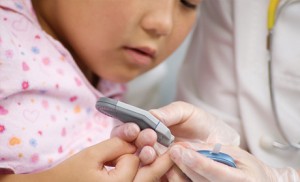Debating School Safety Demands for Children with Diabetes
For a student dependent on insulin, diabetes must be managed 24/7 including the many hours spent at school, on field trips, and during extracurricular activities. Some families can send their child with diabetes off to class in the morning and feel confident that the school is prepared to meet his or her medical needs. Other families, however, worry that their youngster won’t have safe access to proper diabetes management, be excluded from activities, or have to take an exam when blood glucose levels are plummeting.
The American Diabetes Association’s Safe at School program provides educational information and resources to help families, schools, and healthcare providers work together for the benefit of the student with diabetes. Trained volunteers and staff provide assistance to parents to ensure that their children are safe at school and have the same opportunities to excel as other typical children.
Each summer, the Association hosts workshops to help parents prepare for ‘back to school’ with information about legal protections that ensure the safety of their children while at school. These protections include:
- Section 504 of the Rehabilitation Act of 1973, which affords equal access and special considerations for children with disabilities.
- Individual Health Plan, which provides information about how diabetes management for an individual child will be implemented in the school, including details about blood-glucose testing, insulin dosing, monitoring food intake, and physical activity.
Effective diabetes management at school is a team effort! When misunderstandings or disagreements arise, parents need to carefully evaluate the situation and consider these strategies: education, negotiation, litigation, and legislation. Of course, parents and schools have the same goal: to ensure that students with diabetes are safe at school and that both health and learning are fully supported.
 Education can go a long way toward preventing or eliminating challenges to diabetes care. Parents, health care professionals, and school nurses can accomplish this by instructing school staff about the individual child’s needs and general diabetes management. School nurses can play a pivotal role in getting current, relevant information to both, parents and school staff. However, teaching and learning should be a reciprocal process. Parents and school staff must educate each other about key issues related to diabetes care in schools. Potential conflicts can be avoided if both parties take an active role in informing one another about what they know and what they fear in regards to this issue.
Education can go a long way toward preventing or eliminating challenges to diabetes care. Parents, health care professionals, and school nurses can accomplish this by instructing school staff about the individual child’s needs and general diabetes management. School nurses can play a pivotal role in getting current, relevant information to both, parents and school staff. However, teaching and learning should be a reciprocal process. Parents and school staff must educate each other about key issues related to diabetes care in schools. Potential conflicts can be avoided if both parties take an active role in informing one another about what they know and what they fear in regards to this issue.
Being an advocate for a student with diabetes is not about winning or losing. It’s about a collaborative approach between schools and healthcare professionals to create a safe, healthy environment so that diabetes doesn’t impede learning and participation, or even attendance to one’s school of choice in general.
When Marlys Hayes’ daughter, Gwendolyn, was selected through a lottery system to attend their desired Public Charter School, they were ecstatic! Yet, when presented with Gwendolyn’s 504 Plan, the school’s initial response was, “we don’t do that.” Gwendolyn’s registration process was promptly halted and, naturally, Marlys became concerned that the school would not accept her daughter…just because of her diabetes diagnosis!
Fortunately, during the previous summer, the Hayeses participated in an American Diabetes Association Safe at School workshop. Armed with knowledge about various legal protections affording their daughter equal access to all publicly funded schools, they recognized that the question of attendance merely because of her medical condition was not right and began to look into ways to “stand up for the rights of their daughter.”
Effective advocates, like the Hayes family, work to understand the concerns of school personnel and negotiate toward an agreement suitable to everyone involved. After contacting the American Diabetes Association for additional support and speaking with the Association’s staff attorney and local Program Director, Marlys felt confident that she possessed the tools to educate and negotiate with the Charter School.
“Going into this, I was shocked,” recalled Marlys. “I initially did not know where to focus my efforts. The American Diabetes Association’s guidance was paramount to keeping things moving in the right direction, and also helped to calm me when things seemed to get ‘ugly.’ I knew I was not alone, and that truly made all the difference to me.” After many phone calls and more than a dozen emails exchanged between the Hayeses and the prospective Public Charter School, the registration process got back on track and Gwendolyn is now looking forward to transitioning to the Middle School of her choice after this summer break! The next step in the process is to confirm that school personnel are trained by the school nurse on how to provide support as outlined in the Health and 504 Plans.
25.8 million children and adults in the United States ─ 8.3% of the population ─ have diabetes; however statistics estimate that as many as 7 million more could be living with undiagnosed diabetes. Seventy-nine million people are considered to have pre-diabetes and, thus, are at risk for developing the disease. Parents of children with diabetes should call 1-800-DIABETES for a printed school discrimination packet, to learn about parent advocacy workshops, and to connect with trained school advocates and attorneys who can provide individualized guidance. The Association also offers training materials and seminars to diabetes healthcare professionals and school nurses who, in turn, train school personnel on diabetes care tasks. Learn more at www.diabetes.org/orlando.






